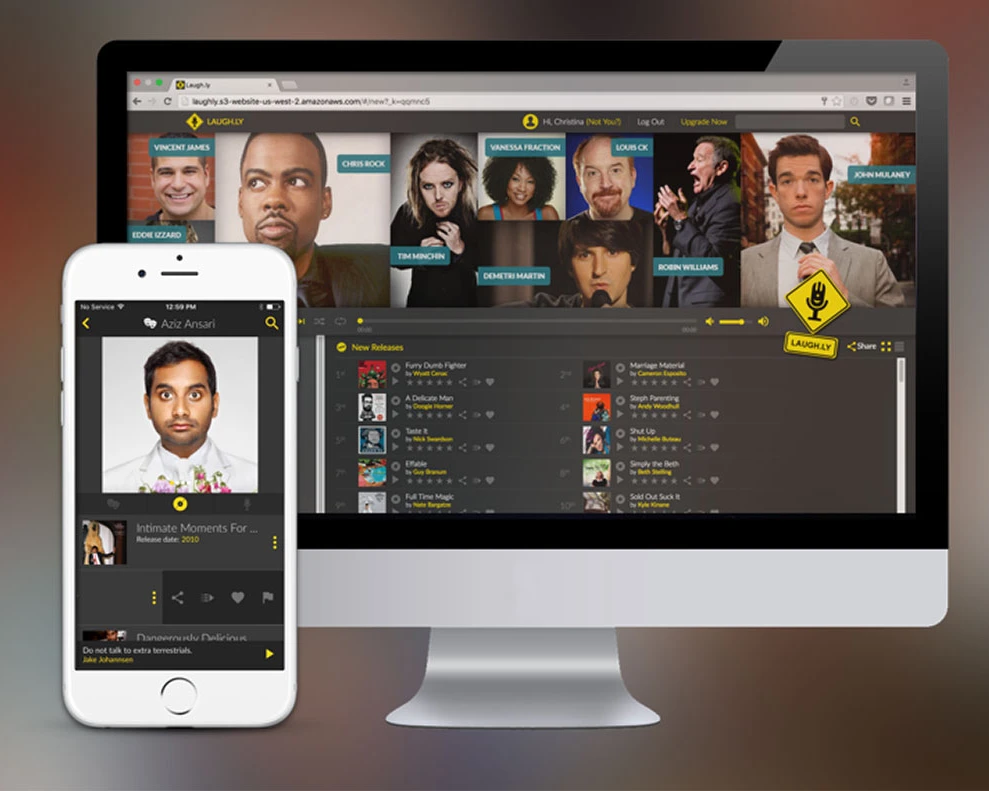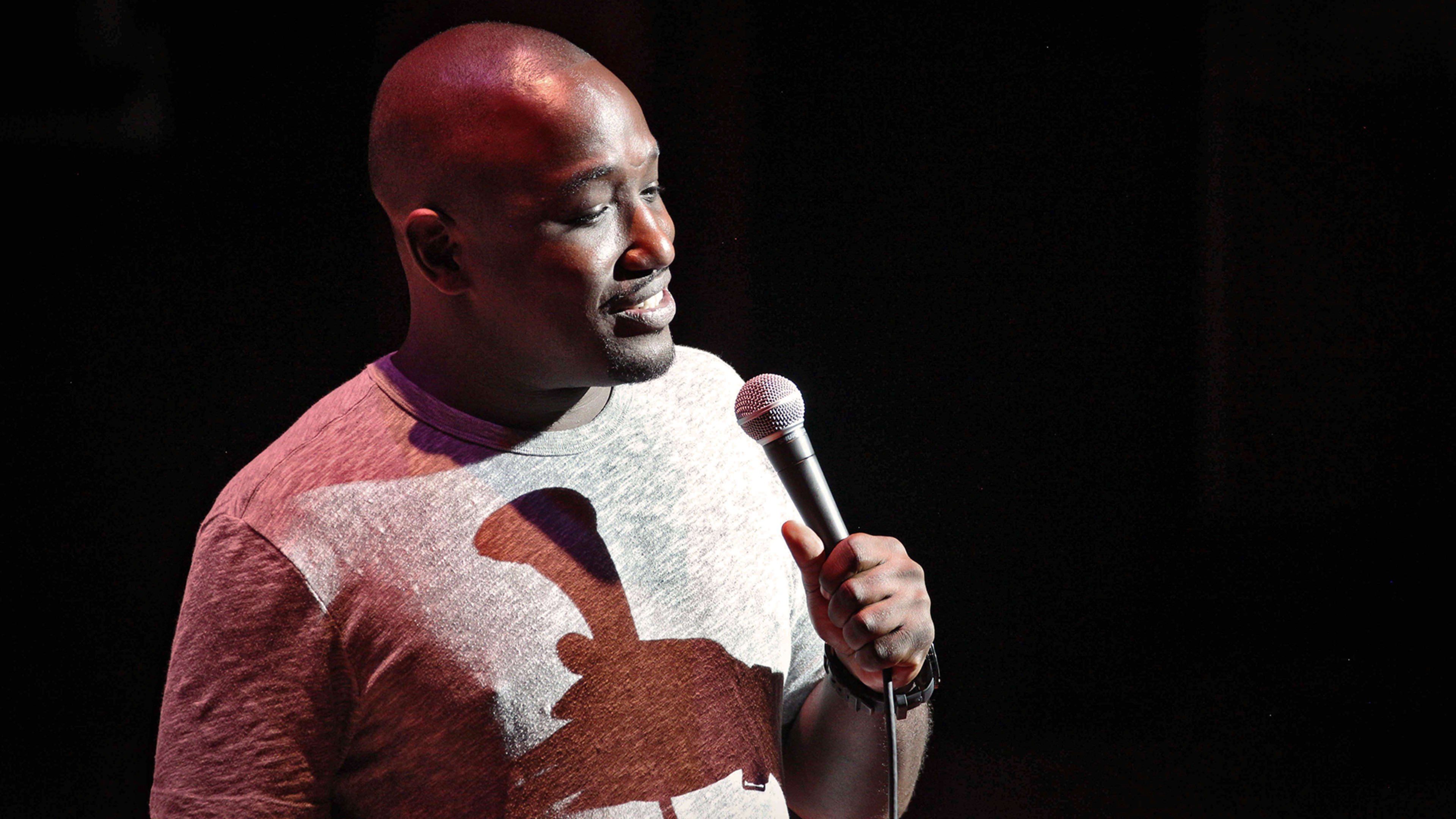It was while performing onstage at New York’s famed Gotham Comedy Club that Dave Scott realized comedy was more than just tough—it was bad business.
The former CEO of Marketfish, a VC-backed data management platform startup, always wanted to pursue his passion of comedy. After selling his company in 2013, he did just that. Scott left Silicon Valley to try his hand in the late-night club circuit in Manhattan. It was fun—he found himself touring with Janeane Garofalo and hanging with Amy Schumer (“before she got huge,” he clarifies)—but he wasn’t making any money.
“If you’re a comedian, expect to be at this for five or 10 years before you become [successful],” says Scott. “Until then, it’s really harsh . . . the distribution method that exists for musicians don’t exist for comedians.”
The frustration over the inability to disseminate his jokes beyond 20 people a night led Scott to found Laugh.ly, the first streaming app built solely around stand-up comedy. Launched last August, the startup offers thousands of hours of comedy from well-known comics like Louis CK, Daniel Tosh or Sarah Silverman, current breakouts like Hannibal Buress and Ali Wong, as well as up-and-coming acts. There are two listening options—one that’s ad-supported and free of charge or a premium service for $3.99 per month.

The app is intended for die-hard comedy fans looking for obscure albums as well as casual fans in the need of a midday lift. Users can search two to five-minute tracks and full albums by topic, comedian, or discover new talent based on humor preferences, be it dry, dirty, family-friendly or observational. If you skip or favorite a track, the algorithm learns your sense of humor, helping you craft a personalized playlist.
Laugh.ly also patented a speech-text algorithm which scans for text (and profanity) within a joke so one can filter for subject matter. For example, search for “hot pocket” and be led to Jim Gaffigan’s famous rant. Or search “Trump” and stumble upon John Mulaney observing the tycoon is “what a hobo imagines a rich man to be.”
In a way, it sounds like Spotify for jokes. That’s because Scott modeled his company on what the music industry offers artists—a functioning distribution model. It wasn’t too long ago that exact model once catered to comedians.
During radio’s heyday, musicians and comedians alike benefitted from airplay, securing them exposure and thereby album and ticket sales. You could walk into any record store and purchase a Rolling Stones record alongside a Steve Martin album.
“Standup comedy is an audio format and it was created and perfected on radio,” says Scott of legendary comics like Jack Benny, Jackie mason or Richard Pryor. The latter didn’t do his first video till the late ‘70s. The concept of people watching stand-up comedy, says Scott, is a relatively new phenomenon. “I’m not even convinced video is the best way to listen to comedy,” he asserts.
Today, however, “comedy has no outlet like radio,” bemoans Scott. Once consumers began downloading content, albums made way for single sales. Shortly thereafter, streaming took hold, opening the market for companies like Spotify and Pandora. Popular artists understood that people didn’t need to buy the full cargo when they could rent one hit.
“But you can’t do that for comedy,” says Scott. “What are gonna do—sell a joke? [Charge] 99 cents a joke?”
The airwaves changed, leaving comedy behind. The only existing media market lies with video; HBO, Showtime, and more recently Netflix all invest in comedy specials (with $200 million dollars spent this year alone). But that only services the top tier of comedians.
“Now imagine you’re one of the 4,000 comedians who doesn’t have a Netflix special,” says Scott, asserting, “we want to bring audio distribution back.”
The Competition
There are plenty of places to consume comedy: You can hop on YouTube, sort through various streaming channels, or listen to thousands of podcasts devoted to the genre. But those, says Scott, fail at two functions: search and curation.
Half of podcasts are comedic, with established podcasters like Marc Maron or Chris Hardwick leading the way. Plenty of content exists—either by the podcast distribution outlet or via the comedian’s personal app—but most do not contain topic categories. Not to mention, the majority of comedic podcasts are in interview format, not stand-up.
Sirius XM now has nine comedy channels, increasing from two just a few years ago. Comedy is the satellite radio company’s no. 2 most-listened-to category after Howard Stern. “But you can’t take it with you,” Scott says. “It’s made for the car.”
YouTube boasts thousands of comedy act clips, but Scott describes it as a “jack in the box” experience: not everything if there in full, quality is generally poor, and you’re not guaranteed you’ll find what you’re looking for. HBO Go, meanwhile, only represents 5% of its comedy catalog at any given time.
Not to mention, less than half top comedian’s output, like of Aziz Ansari, is even available in video format.
“What if I really want to study great [comedic acts] by comedians like Robin Williams or Eddie Murphy? There was no easy way for me to do that,” says Scott. “It’s like a roulette wheel as to whether you’ll get to see the special you’re looking for.”
Spotify, meanwhile, does feature comedy and playlist options, but cherry-picked only the top comedians from the major labels, resulting in 2,000 hours and 130 albums. In comparison, Laugh.ly carries 700 comedians and 18,000 hours of comedy. This equates to over 200,000 tracks.
There are other stand-up comedy apps on the market, including Comedy Central or the aptly named Stand Up Comedy app, but both specialize in video, not audio, in limited quantities. Laugh.ly aims to be the destination with the most comprehensive and organized comedy library. And more than that, it wants to reintroduce the American consumer to the pleasure of listening to comedy albums.
“We believe there’s a comedian out there for everyone,” he says, “and if they give us a chance, we can help them find their comedian.”
https://youtu.be/YAJOjsJIIKA
Rethinking The Industry
Scott began working on what would become Laugh.ly in 2013, collaborating on the app with the very first designer for Spotify. But he put the project on the back burner in 2014 after taking a job offer as CMO at Livefyre, a company that specializes in user-generated content tools. When that company was sold two years later, Scott dusted off his business plan to revisit his passion project. He moved back to San Francisco and started recruiting developers with a simple, if not trite, pitch: “The world needs more laughter, it’s the world’s oldest medicine.”
Scott then reached out to the three companies that essentially control most music industry catalog rights: Sony, Warner Music, and Universal. Combined, the trio owns 20 percent of all comedy catalogs. The other 80 percent belong to mom and pop labels like Uproar Entertainment or the comedians themselves. He personally reached out to those as well.
“If music is an oligopoly, then comedy is more a democracy,” says Scott.
When Scott went to the big three, he was met with puzzled executives who all echoed the same sentiment: “‘Huh, no one’s ever asked for these back catalogs before,’” recalls Scott. The old comedy albums were languishing on the shelves.
With the individual artists, Scott cut direct deals, offering them 50% revenue of all advertising and subscription proceeds. He says nearly all were enthusiastic about the prospect of building their business and expanding their audiences. Only 5%, says Scott, have their own TV shows or cable specials. Laugh.ly gives them the ability to directly upload albums straight to the app.
“We’re putting money into the pockets of working comedians,” says Scott.
The team finished the product within six months. Two weeks before launch, this past August, Laugh.ly won the TechCrunch Startup Battlefield competition and overnight, says Scott, the app’s waiting list went from zero to 10,000 users. The week following launch, Apple iTunes Store editors featured it. Within 30 days, Laugh.ly had 100,000 downloads.
In December, Laugh.ly announced it secured a $2.25 million seed round and staff increased to a total of 14. In February, the startup partnered with some of the biggest comedy clubs in the nation, including Gotham Comedy Club, to live stream comedic events and comedy festivals straight from the stage.
Today, Laugh.ly boasts 200,00 installs, with the active user consuming an average of 51 minutes per session. In March, users consumed over 5 million minutes of comedy. There’s a subset of 1,000 hardcore users, whom Scott describes as “comedy nerds,” who listen to approximately 117 minutes per session. Of those folks, he says, some ended up being recruited to curate content, test early builds, and “shape the future of the app,” in exchange for free premium services.
According to the company’s research and recent user survey, the average Laugh.ly user is male, 27, and college educated. The no. 1 time listeners use the app is between the hours of 7:00-9:00 p.m., presumably as a way to wind down after work while multitasking other activities like cooking dinner or working out.
The second most popular time was the commute home, right after 5:00 p.m., with the third belonging to the commute en route work. Basically, Laugh.ly is the glass of wine following a long day.
“What we found [from user feedback] is how important laughter is as a means of therapy and stress relief,” says Scott.
Moving forward, Laugh.ly will extend into the heavily saturated market of comedy podcasts. The company intends to incorporate 100 comedy podcasts before introducing their own. Podcasts, says Scott, have become mainstays of the comedy industry.
“We want to be the audio comedy destination no matter what that comedy is, and you can’t be the comedy destination if you don’t have everything,” explains Scott, “and podcast is a large part of that.”
Essentially, Scott wants, as he puts it, “everything and the kitchen sink,” when it comes to audio comedy. That means further down the line Laugh.ly will likely even sell tour tickets straight from the app. “Being able to bridge that gap between live tours and comedy is gonna be the last mile for us,” he says.
“You can get comedy anywhere,” says Scott, “but we are the only app that’s solely dedicated to standup comedy in audio format . . . We have the full story.”
Recognize your brand’s excellence by applying to this year’s Brands That Matter Awards before the early-rate deadline, May 3.
